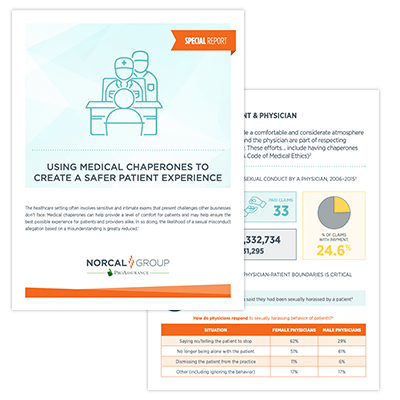

To preserve confidentiality, provider-patient communication should take place privately after the examination. Conversation between the provider and the clinical chaperone during the sensitive exam should be kept to a minimum and to only when necessary. The presence of a clinical chaperone in the exam room should be limited to the duration of the sensitive examination.In all circumstances when the provider requests the presence of a clinical chaperone but the patient refuses, the clinical encounter will immediately cease.Options will be discussed and if the exam is to continue, a clinical chaperone matching the patient’s identified sex should be offered and documented. At any time during any examination, sensitive or non-sensitive, whenever a patient expresses or displays any indication of discomfort, the examination should be stopped.However, under no circumstances will a male provider be permitted to perform a sensitive exam on a female patient un-chaperoned, or with a male chaperone, even if that is the female patient’s request. If a same sex chaperone is unavailable, the patient will be offered the options of 1) an opposite sex chaperone, 2) no chaperone, or 3) rescheduling at a different time to a provider of choice.If the patient chooses to decline a chaperone, this will be documented in the Health Record for the visit. If the need for the exam is not urgent, the patient will be offered the option of rescheduling with a provider of choice. A same sex clinical chaperone (nurse or medical assistant) is required to be offered by the provider to be present in the exam room, which the patient may choose to decline.Notwithstanding the presence of the chaperone, prior to initiating any sensitive examination, all providers must clearly communicate with the patient the need for the exam and describe how it will be performed. The medical assistant preparing the patient to be seen for a sensitive exam will be responsible for advising the patient of the duties of a chaperone, assessing if a chaperone is requested or declined, documenting the patient’s choice in the Health Record, and assuring that the provider is aware. This policy applies to these cases as well. On occasion, a sensitive examination is not anticipated, but is determined to be medically necessary through further clinical review. Therefore, to minimize patient discomfort, when a clinic appointment is requested where it is anticipated a sensitive examination will be medically necessary, the priority will be that the patient be scheduled with a same sex provider. Medical examinations and clinical procedures involving the breasts, buttocks, or pelvic area (hereby referred to as “sensitive”) are potentially discomforting to the patient. be prepared to raise concerns about a provider's behavior or actions.be present for the entire exam and can see what the provider is doing, if practical.be familiar with the procedure involved in a routine sensitive examination.be sensitive and respect the patient's dignity and confidentiality.The presence of a chaperone during sensitive examinations may also help protect providers themselves from false allegations of abuse. But they can also reassure or comfort patients during examinations that they might find embarrassing or distressing.

MEDICAL CHAPERONE PROFESSIONAL
Your healthcare professional may also require a chaperone to be present for certain consultations in accordance with our chaperone policy.A chaperone's principal responsibility is to protect patients from abuse. Wherever possible we would ask you to make this request at the time of booking your appointment so that arrangements can be made and your appointment is not delayed in any way. On occasions you may prefer a formal chaperone to be present, i.e. This chaperone may be a family member or friend. It also maximises the healthcare professional’s safety whilst carrying out consultations (particularly those with intimate examinations/procedures) and minimises the risk of their actions being misinterpreted.Īll patients are entitled to have a chaperone present for any consultation, examination or procedure where they feel one is required.

We are committed to providing a safe, comfortable environment where patients and staff can be confident that best practice is being followed at all times.Ī chaperone is a person who accompanies and looks after another person to ensure that a their privacy, safety and dignity is protected during intimate examinations and procedures.


 0 kommentar(er)
0 kommentar(er)
